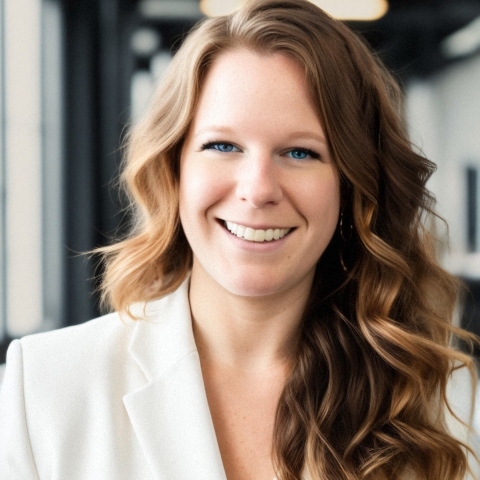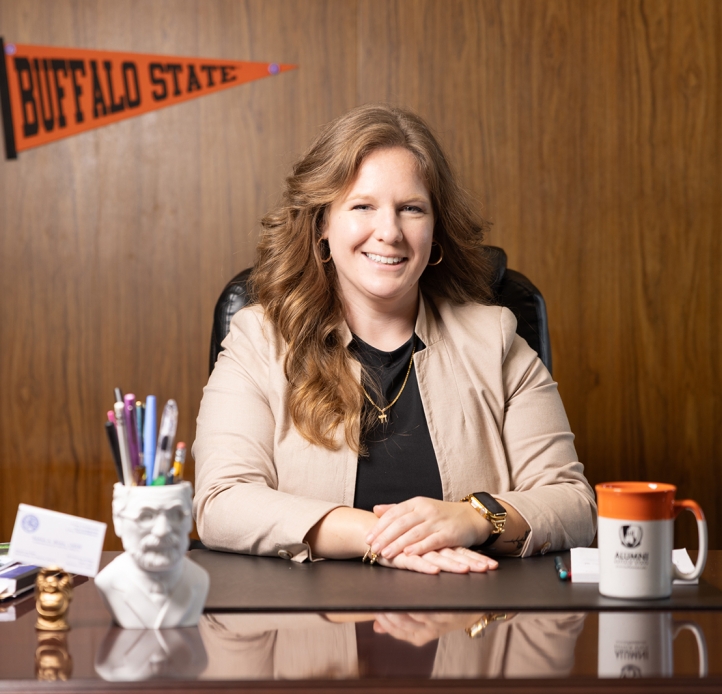At Buffalo State, the study of psychology is hands-on—students learn not only the science, but also the application of that science. Thanks to individualized attention from expert faculty, field experience, and research opportunities, our psychology graduates are well-prepared for the pursuit of advanced degrees and a range of careers in the helping professions, human services, education, research, and so much more.
Degrees Offered
Applied Psychology, B.A.: A scientifically-oriented undergraduate program designed for students who want to pursue applied careers in psychology and related fields. While still rigorous and data/evidence-based, students gain field experience and advanced skills in evaluating and using scientific data, as well as complete an internship, service-learning course, or independent project. *All majors begin in the B.A. program.
Psychological Science, B.S.: Designed for students interested in a more traditional path in psychology, geared toward research-focused graduate studies and careers that emphasize advanced research training. Elective courses are the same as in the B.A. but required B.S. courses emphasize research methodology and experience to a greater extent and include either an independent study, honors thesis, special project, or course in advanced research methods. *Students can switch from the B.A. program after completing PSY350 with a minimum grade of B-
Psychology B.A./B.S.-Applied Behavior Analysis, M.S., Combined Pathway: Allows qualified Buffalo State students to begin work on a Master of Science (M.S.) in Applied Behavior Analysis while completing a bachelor’s degree in either Applied Psychology or Psychological Science. Twelve credits of designated master’s courses are incorporated into the B.A. or B.S. program and count toward both the bachelor’s degree and the master’s degree.
13,000
Annual job openings
12-30
Students per class
500+
Current majors
6
Areas of specialization
2
Internship tracks: field-study or teaching
Who Hires Our Students?






Psychology majors are prepared for careers in human services, human resources, research, counseling, and other fields.
With a bachelor’s degree, you may work as a:
- case worker
- substance abuse counselor
- child protection services agent
- behavior analyst
- probation/parole officer
- psychiatric technician
- rehabilitation professional
- family services professional
- group home attendant
- employment counselor
With a master’s degree, you may become a:
- school psychologist
- mental health counselor
- social worker
- family and marriage therapist
- psychometrist
And, with a doctoral degree, you can be a:
- clinical psychologist
- behavioral neuroscientist
- professor
- researcher
- counseling psychologist
Introduction to Psychology (PSY 101) is the prerequisite for all other psychology courses. This introductory course examines research methods, principles of learning, sensation and perception, normal and abnormal personality, motivation, emotion, frustration, conflict, development, the biological bases of behavior, testing, and social behavior. Students must pass PSY 101 with a grade of “C” or better to be a psychology major.
All psychology majors are required to take four core courses: PSY 101 Intro, 350 Statistics, 360 Evaluating Psychological Science, 468 Professional Skills in Psychology.
Students in both programs complete elective courses in Clinical/Counseling, Developmental, Social/Personality, Bio/Cognitive, and Applied/Diversity, as well as individualized experiences that provide “hands-on learning” as part of their degree process that highly prepare them for careers in the field and graduate study. For B.A. students, options include service learning courses, internships, or individualized projects. For B.S. students, this involves advanced-level research projects such as an individualized study or honors thesis.
Psychology Club
Open to all students with an interest in psychology; provides a primary vehicle for students to get involved in the social and academic life of the Psychology Department. Activities include sponsorship of Speakers Series, field trips, “get acquainted” meetings, and fundraising activities.
Psi Chi Honorary Society
The international honorary society in psychology. The chapter is actively involved in the department and coordinates its activities with the Psychology Club. Psi Chi members are invited to provide feedback on faculty recruitment and promotion. Members of Psi Chi informally sponsor a Psychology Tutoring program.
Child Advocacy Club
A student club that is open to all majors/disciplines and is focused on promoting events and connecting those interested in child advocacy issues.
Psychology Students Interested in Community Outreach (PSICO)
A student club devoted to helping others in need through fundraising activities that benefit both people and animals in local and global communities.
Hulicka Scholars Program
Designed to identify and support high-achieving psychology majors; introduces students to departmental and university opportunities that can enrich their experiences, stimulate curiosity in the field, and better prepare them for advanced pursuits towards graduate school and careers.
Many undergraduate psychology students at Buffalo State participate in research typically only experienced at the graduate level. Student research is conducted either in the laboratory or within the Buffalo Niagara Region.
Students with an interest in a particular topic area of psychology have historically gravitated toward faculty members for independent studies/projects. The “research team” idea takes this one step further. Under the tutelage of the faculty member, students with similar interests form a team to study a research area in a systematic and ongoing basis.
Students can also work with faculty on research projects for credit, which allows them to gain valuable experience individually or in groups, while assisting in an ongoing research project on a number of levels – particularly data collection, analysis, and presentation. Independent study research experiences are designed to be flexible and to optimize the match between faculty and student interest.
“Psychology is everywhere, especially in the workplace. That really interested me, that there’s a way to do this that’s applied and that fit with who I am.” - Ryan Tetreault, ’20
Specialization Areas
Students can focus on clinical psychology, cognitive psychology, developmental psychology, social psychology, behavioral neuroscience, or industrial/organizational psychology.
Minors and Microcredentials
Buffalo State offers a variety of complementary minors and microcredentials for psychology majors, including criminal justice, coaching, child advocacy studies, Spanish for mental health professionals, and many more.
Child Advocacy Studies Certificate
The Child Advocacy Studies certificate focuses on interdisciplinary, ethical, realistic, and culturally sensitive content that provides a foundation for identifying, understanding, and responding to child maltreatment.


